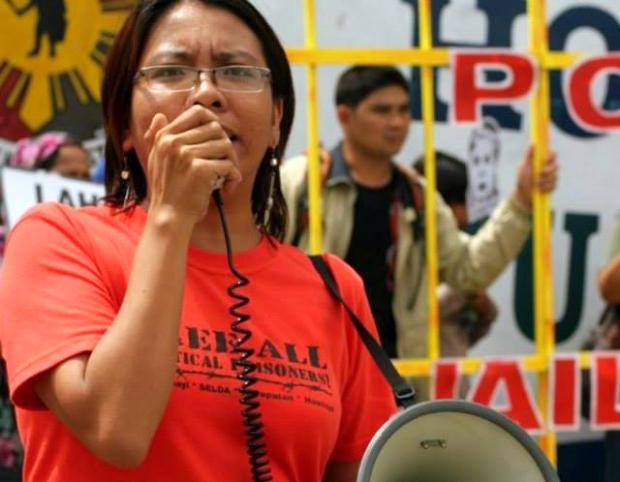
Cristina Palabay, secretary general of Karapatan (Photo from her Facebook page)
State security forces continue to use torture to intimidate detainees under the Duterte administration, according to militant human rights group Karapatan.
In a statement issued on Monday, which is International Day in Support of Victims of Torture, Karapatan Secretary General Cristina Palabay cited the cases of peace consultant Ferdinand Castillo and peasant organizer Rommel Tucay, political prisoners tortured under the present administration.
“The use of torture remains routine for State security forcesm,” Palabay said. “Political prisoners, for example, have been subjected to such cruel, inhuman and degrading acts, done by the police or the military for purposes of humiliating them and breaking their spirit.”
Palabay said Castillo case was arrested last Feb. 12 by members of the Criminal Investigation and Detection Group (CIDG) of the Philippine National Police (PNP) and the Intelligence Service of the Armed Forces of the Philippines (ISAFP). He shoved inside a vehicle with his eyes blindfolded and mouth gagged and later strangled.
Palabay said Castillo was blindfolded for four hours and grilled by his captors, who alleged that he had no right to demand a counsel and insist on other rights accorded to a detainee.
His captors also threatened his life and his family’s, Palabay said.
Meanwhile, Tucay was allegedly arrested by members of the 73rd Infantry Brigade and the 56th Infantry Battalion on March 22, Palabay said.
He said Tucay was tied and was beaten and kicked by his captors. He was blindfolded with a towel and masking tape and then dragged into a vehicle.
Tucay was psychologically tortured on board the vehicle when his captors allegedly threatened to throw him innto a river, Palabay said.
Tucay was brought to the Provincial Public Safety Company compound in Cabanatuan City where he was further interrogated and later slapped with trumped up charges of illegal possession of firearms and explosives.
Palabay said state security forces continued to torture detainees even though the Philippines is a signatory to the UN Convention against Torture and Other Cruel, Inhuman or Degrading Treatment or Punishment, and despite the passage in 2009 of the Anti-Torture Act.
“The need for these safeguards is indicative of the abhorrent practices that State security forces engage in,” Palabay said. “Such measures attempt to prevent the proliferation of inhuman and degrading treatment, yet there has been a constant gap between the law and its implementation.”
Palabay said that, as of May 31, Karapatan had documented 52 cases of torture under the Duterte administration.
Karapatan also documented 248 cases of torture during the previous Aquino administration, Palabay added. /atm